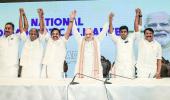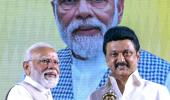Over the medium and long term, the BJP hopes to devour the AIADMK, they having identified the party as 'ideologically not as sound as the DMK', predicts N Sathiya Moorthy.

In negotiations for alliance-revival for next year's assembly elections in Tamil Nadu, the AIADMK's Edappadi K Palaniswami (EPS) showed the tough streak of his political mentor, the late Jayalalithaa Jayaram.
But on substantive matters that are all in the future, the Bharatiya Janata Party's strategist par excellence Amit Shah seemed to have had the last laugh.
Yet, in playing tactical one-upmanship both might have left a lot uncovered in a high stakes drama, whose other elements would take time to unfold in full.
On alliance-revival, EPS won on three major counts -- that he would be the chief ministerial candidate, the BJP would not 'interfere' in AIADMK's 'internal affairs' and yet would yield to his demand and replace state party chief K Annamalai.
But Amit Shah possibly won the future for all time to come when he declared that it would still be an 'NDA government' under EPS, if they won.
In simple terms, it means that the BJP and possibly other allies would have a share in power -- the first time that the state would have a multi-party dispensation.
But over the medium and long term, the BJP hopes to devour the All India Anna Dravida Munnetra Kazhagam, they having identified the party as 'ideologically not as sound as the DMK' even when Jaya was around, to be able to resist poaching of any kind and every kind.
Between the AIADMK and the DMK, only the former has mutually-transferrable votes for the BJP, indicating a mindset that is amenable and agreeable.
Of course, when the BJP and the DMK were allies in the 1999 Lok Sabha polls and the 2001 assembly elections, there was transferability of DMK votes to the BJP, but not the other way round.
There is, however, no denying the fact that the BJP's traditional three per cent vote share went up to eight under Atal Bihari Vajpayee but only in the Lok Sabha polls and now under Prime Minister Narendra Modi, but only less not more under the latter.
The BJP leadership, after hoping to win over the DMK, gave up, acknowledging that the party could not align without 'reverse transferability', not especially when it stood to lose the 15-per cent 'minority vote bank', more so because of MoShah duo's 'hard-line Hindutva politics'.
In context, AIADMK insiders are upset that EPS's 'unthinking' decision without adequate consultations will reverse the minimal return of the minorities to the party's side when the party contested last year's Lok Sabha polls sans the BJP.
Actor-politician Vijay with his infant Tamizhaga Vettri Kazhagam sees an opportunity where none other now exists for him after the alliance-revival, by deciding to move the Supreme Court on the Waqf Act.
Like when EPS met Shah in Delhi a few weeks ago, Vijay has once again come up with a delayed reaction that the assembly polls would only be between the DMK and the TVK.
It's something that even his cadres find hard to stomach, especially after the BJP-AIADMK alliance-revival.

Some AIADMK second-liners hope if between them Shah and Modi could ensure that the Hindutva streak of their party and government is not on display at least for another year.
Such developments, either at the national level or by 'errant' elements in BJP-ruled states, starting with Uttar Pradesh and Gujarat, could put the AIADMK on the defensive when it could ill afford it.
The reasons are not far to seek. From before the 2024 Lok Sabha polls, EPS himself has been feeding on and also feeding in turn, the anti-Hindutva, anti-BJP thinking among AIADMK cadres.
The latter attributed past alliance defeats in 2019 and 2021 and also the unlikely consolidation of the rival DMK in 2024, to the anti-Hindutva, anti-Modi mood of Tamil voters and AIADMK cadres in that order.
Throughout this period, and more so in the past month or so, EPS added fuel to the fire, by the party backing the DMK state government's assembly resolutions against the Waqf Bill and delimitation in particular, and the Kachchatheevu issue otherwise.
In the days after his Delhi meeting with Shah, he went overboard by declaring to party cadres that there would be 'no alliance with the BJP now or ever'.
Yet, some in the state BJP and also the AIADMK feel that they would have to rope in the TVK, to make theirs a 'victorious alliance', as the late DMK patriarch M Karunanidhi had conceptualised one for the Lok Sabha polls of 2004.
For such a possibility, all NDA partners should agree to contest few seats and win the most, rather than contest more and lose all.
Neither side believes that Vijay has an 18 per cent voter pull, as predicted by some pollsters not very long ago.
With alliance-revival now, whatever little vote share he could have hoped for might shrink as the election is becoming increasingly polarised 'between alliances led by the DMK and the AIADMK', as always.
There is equal concern if EPS would be ready to accept his detractors like OPS, T T V Dhinakaran and Sasikala Natarajan in the NDA fold without re-admitting them into the AIADMK.
Or, if he would be willing to accommodate recent dissenters like K A Sengottiyan, with whom Amit Shah had opened a separate line of communication.
If anything, EPS will be uncomfortable with the likes of OPS and TTV in a ministry under his care.
He would also be eternally suspicious of Sengottiyan and others as 'Trojan horses' of the Ajit Pawar kind.
Against this, his loyalists like former ministers D Jayakumar and C V Shanmugam are upset with alliance-revival and more so with EPS' 'unilateral decision', unlike the MGR-Jaya duo, who always entertained and encouraged broad-based consultations at all levels.

Independent of the BJP national leadership's assessment, the new state BJP president Nainar Nagendran may not be a vote-catcher, more so among the traditional Mukkulathore community stronghold of the AIADMK ally.
Nagendran, from the Thevar sub-sect of the influential Mukkulathore community in southern Tirunelveli district, does not belong to the self-styled 'blue-blooded' grouping spread across half a dozen districts in the Cauvery delta.
Though they might have lost much of the clout, OPS, TTV and Sasikala still may have a greater sway in the region than Nagendran or the BJP otherwise.
If nothing else, any or all of these three contesting alone or together might make it that much more difficult for the NDA, despite the claims that together the BJP and the AIADMK are strong in this belt.
Recent election results do not prove the point, which was true only of the MGR-Jaya era, even then with a few exceptions, as in 1996 and 2004.
There is also an added concern that if the BJP were to contest more seats under the alliance, those constituencies could well become a cakewalk for the DMK in particular, and the party could focus more on other constituencies and those of its allies.
The reverse is equally true for the AIADMK in constituencies contested by the DMK's allies, and not the party per se.

All this does not mean that the ruling DMK under Chief Minister M K Stalin will have a fourth electoral victory in a row since 2019.
Going by simple arithmetic, the rival alliance-revival has made it visibly tough even without their old allies like the PMK, DMDK and the TMC, of whom the former is caught in the throes of a father-son duel for supremacy within.
The DMK has the Congress, two Communist parties, the IUML and the VCK as partners since 2016.
In the immediate context, following Shah's declaration of an 'NDA government' if the alliance won, there would be separate internal churning, especially within the Congress and the VCK, for an 'INDIA combine government' of the DMK under Stalin 'if/when' they won the assembly polls next year.
However, alliance-revival has actually made those claims sound weaker as the leaderships of those parties are well aware that they need the DMK cadres more than the other way round, especially in a 'tough election' as it promises to be.
In electoral terms, Amit Shah has begun well by naming Stalin and his son and heir-apparent Udhayanidhi Stalin, at present the deputy chief minister, as their main electoral targets.
At the news conference, where EPS sat meekly by his side, Shah also rolled out corruption figures in independent departments of the state government, indicating where his dispensation's interest now lies.
The DMK's immediate attempt is to continue to keep the BJP, Modi and Hindutva in electoral focus for one more time -- and still hope to win.
That is still a tall order, but then alliance-revival across the aisle has meant that most, if not all of the 15-per cent minority votes would go with the party all over again, rather than partly going to the TVK, which the DMK claims has lost the initial drive.
The DMK, instead, seems to hope that in the light of the 'pan-Tamil' ideological revival under Stalin's 'Dravidian model' they could still convince that all the ED-IT-CBI raids and arrests, past, present and future, were all a part of the BJP's electoral frustration taking the shape of 'political vendetta'.
Such a construct is arguable, yes, but Tamil Nadu has the dubious history of political corruption -- big and small -- not becoming an election issue anytime in the past.
For all such arguments, the DMK still cannot live down 'anti-incumbency', which has become unpredictable after close to half the state's electorate became 'non-committed, swing' voters, a couple of decades ago -- and remain so ever since.
Apart from perception of political corruption across the board, the government suffers from a widespread social media image of 'lawlessness', ineffective leadership, undisciplined ministers and uncooperative bureaucracy.

The recent controversies involving senior ministers S Duraimurgan and K Ponmudy, respectively the party general secretary and deputy general secretary (since sacked), became muted not because they apologised in public before long, but because Amit Shah made even bigger headlines.
Yet, there was no denying Ponmudy's patently obscene references to the religious marks that Saivite and Vaishnative Hindus apply on their foreheads, and Duraimurugan's disparaging remarks on the disabled.
An enraged Stalin sacked Ponmudy from the party post but there is still widespread demands, both outside the party and less so inside, for his instant removal.
Already, controversial state Governor R N Ravi, who was supposed to have been 'chastened' by a recent Supreme Court verdict, has used the Ponmudy controversy to re-launch himself.
Apart from the possibility of police complaints against Ponmudy in some BJP-ruled state(s), DMK cadres want the chief minister to use the opportunity to drop deadwood and induct fresh blood in the government well in time for the assembly polls.
In a party of the saamaniyan, or 'common man', the cadres are hurt that only moneyed people with father-son connections to ageing party bigwigs are filling every vacancy -- and are also bringing a bad name to the party by facing IT/ED raids, along with their parents.
Incidentally, they are all clear that they have no issues with Udhayanidhi becoming the party's mascot of the future, but want it to end there.
N Sathiya Moorthy, veteran journalist and author, is a Chennai-based policy analyst and political commentator.
Feature Presentation: Aslam Hunani/Rediff.com











 © 2025
© 2025